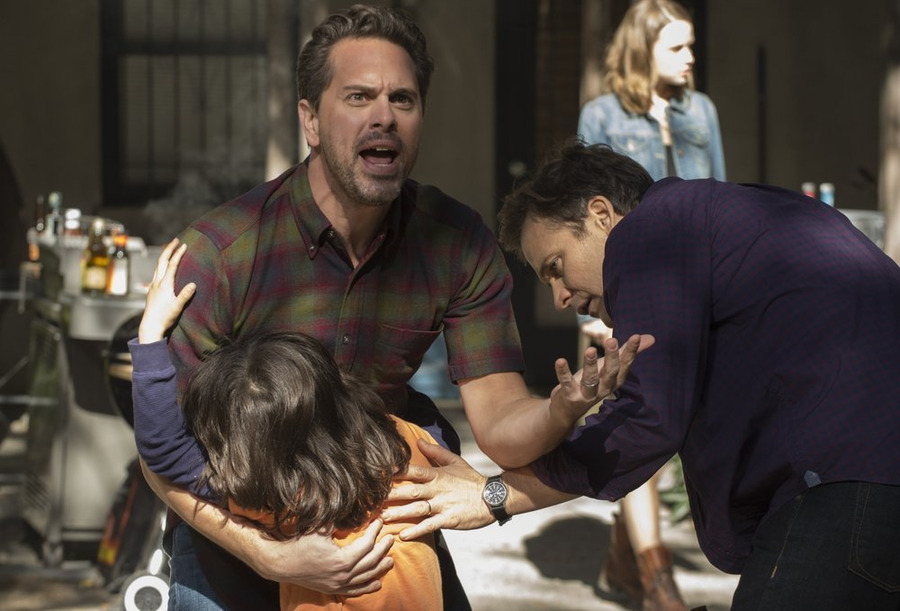
Whatever else you can say about NBC’s The Slap (Thursdays), it is a miniseries people will be talking about. From its premise (man hits someone else’s kid at family party, legal action ensues) to the hot buttons it pushes (income inequality, entitlement, kids today, parents today) to the didactic script, it is pretty much a getting-people-talking machine. This show will get people talking about it even if it has to personally smack every viewer upside the head.
I doubt, however, that they’ll be talking much about how good the show is.
It’s not for lack of talent attached, starting with director Lisa Cholodenko, who most recently filmed the remarkable Olive Kitteridge for HBO. Where that miniseries told the story of an emotionally reserved woman in rural Maine, The Slap focuses on emotionally expressive, affluent cityfolk in Brooklyn.
The title event–if you somehow missed NBC’s ubiquitous ad campaign–takes place at a 40th-birthday barbecue for Hector (Peter Sarsgaard), a sad-sack public servant who, unbeknownst to his wife, Aisha (Thandie Newton), is agonizedly considering an affair with their teenage babysitter, Connie (Makenzie Leigh) and has just missed out on an expected promotion at work. (The missed promotion, at least, is cushioned by the evidence of their sumptuous Brooklyn brownstone, which at an eyeball appraisal is worth a few million on the 2015 market.)
The shindig brings together Hector’s extended Greek family, including his pushy, successful car-dealer cousin Harry (Zachary Quinto), and Hector’s friends Rosie (Melissa George) and Gary (Thomas Sadoski), the artsy, permissive parents of Hugo (Dylan Schombing), an exceptionally bratty boy who reacts to striking out in a backyard baseball game by swinging the bat around threateningly. Upon which Harry confronts the child, rears back, and gives The Slap its title.
Cue the lawsuit. Cue the recriminations (the incident unearths a trove of old family tensions and resentments). Cue the arguments over whether Harry was too cruel or Hugo’s parents too soft. And cue a torrent of reflections on class, morality, and social mores, penned by playwright Jon Robin Baitz, that land more bludgeoningly than little Hugo’s baseball bat would have.
I wasn’t behind the scenes, nor do I know how many of the flaws come from the source material (an Australian TV series in turn based on a Christos Tsiolkas novel). And Cholodenko’s camera does its best, flitting among the characters in the seminal party scene (which also involves surreptitious canoodling between Hector and the sitter), registering their differing reactions and dynamics. But The Slap feels like a broadcast network took an HBO-style project–provocative premise, specific cultural milieu–and then killed it with a pile of “Make the subtext more explicit!” notes.
The first warning sign is a ponderous voiceover that constantly tells us what the series should be showing. (“Hector considered what might happen if he allowed things to go any further with Connie.”) But the narration is positively subtle next to the dialogue, which often sounds less like conversation between human beings than a questions-for-further-discussion list in a school textbook. “What’s happening to this country?” Harry yells in a fit of on-the-nose rage. “The weak suing the strong for being strong!”
Each episode of The Slap is shown from the perspective of a different character. The second follows Harry, and it pulls off a truly impressive feat: it spends an entire hour fleshing out a single person and ends him leaving him less complex than when it started. Harry, it turns out, more than just a rich type-A-hole who slaps other people’s kids. He’s also a rich type-A-hole who pushes around his wife (verbally and physically), berates his own son to be more competitive, and is a sleazebag at work, where he also happens to be sleeping with a saleswoman. (Just to underline the class-war theme, not for the only time, his lawyer assures him that a guy like him will never be punished in court: “This is not how it works, my fellow one-percenter.”)
But Harry’s adversaries are no more likeable, and they too only slip further into crunchy-parent clichés—Gary a bitter, poor artist resentful of anyone with money, Rosie a coddling hysteric who, naturally, still breastfeeds her son of advanced age, like Lady Lysa from Game of Thrones. (The parallel is only strengthened when Harry visits in a grudging attempt to apologize, and a petulant Hugo takes a pause from suckling to identify him as “The bad man who hit me. He’s going to jail.” Make the bad man fly!)
It’s a shame, because The Slap has the ideas and the assembled talent to make a better, subtler character exploration, but it’s brought down by hamhanded characterization and an assemblage of bourgeois-Brooklyn types that it’s impossible (even for another bourgeois-Brooklyn type) to care about.
The one thing I can say for The Slap is to defend it against anyone who would condemn it for its subject matter. The series certainly doesn’t trivialize violence or revel in it. I have seen two episodes, and there is thus far only one actual slap. You will wish there were far more.
More Must-Reads from TIME
- Donald Trump Is TIME's 2024 Person of the Year
- TIME’s Top 10 Photos of 2024
- Why Gen Z Is Drinking Less
- The Best Movies About Cooking
- Why Is Anxiety Worse at Night?
- A Head-to-Toe Guide to Treating Dry Skin
- Why Street Cats Are Taking Over Urban Neighborhoods
- Column: Jimmy Carter’s Global Legacy Was Moral Clarity
Contact us at letters@time.com